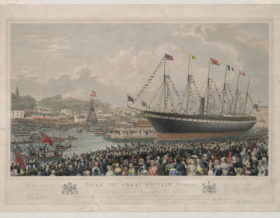The Haitian revolution (1791-1804)
In 1791, Toussaint Louverture led the first – and only – successful uprising of enslaved Africans in St Domingue (now Haïti) on the Caribbean island of Hispaniola. He finally gained complete control and proclaimed himself ruler for life of Saint Domingue in 1801. However, although Louverture declared himself a subject and supporter of France, Napoleon Bonaparte saw him as a threat and he was arrested and shipped to France, where he died in prison in 1803. One of Louverture’s lieutenants, Jean-Jacques Dessalines, continued the bloody fight for permanent freedom and national independence. When French forces surrendered in 1804, Dessalines declared St Domingue a republic, renaming it ‘Haiti’, with Dessalines himself as Emperor. Haiti became the first independent ‘black’ republic, and contributed to the decline of the Transatlantic slave trade. The events in St Domingue became known as the Haitian Revolution.









